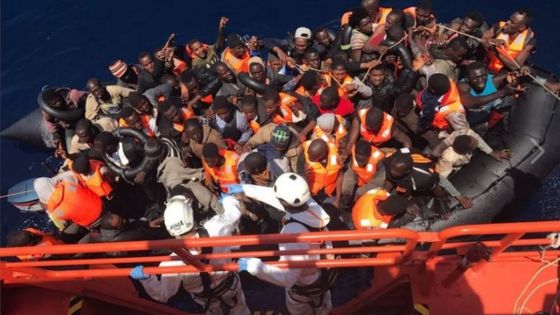
It is believed to be the worst tragedy in the Western Mediterranean this year - 49 sub-Saharan Africans attempting to reach Spain are missing after the boat they were travelling in capsized.
Their dinghy was found deflated 28 nautical miles west of the island of Alborán, midway between the Moroccan coast and Spain.
Three survivors were rescued by the Spanish coastguard on Tuesday. The 17-year-old and two men aged 25 were all taken to Tarifa for treatment for hypothermia and burns.
But hope has faded of finding anyone else alive. The boat had apparently set out with 52 people aboard on Sunday morning and had drifted for days before being hit by a strong wave.
There has been a sharp rise in migrant arrivals on Spain`s south coast this year. Since the start of 2017, 6,464 migrants crossed the Mediterranean to Spain, according to the International Organization for Migration (IOM).
The total in 2016 was just over 8,000 migrants last year, making up only 2% of the total of so-called "irregular arrivals" to the EU.
The vast majority of the 101,000 who have crossed the Mediterranean this year have arrived via Italy. The number of fatalities is put at 2,247.
Even before this tragedy, 60 migrants are believed to have drowned in the Western Mediterranean this year. Andalucía human rights charity APDHA estimates that 6,000 people have drowned trying to cross that stretch of water since 1997.
"Right now we`ve got the capacity to handle this but it is stretching us," said Samuel Linares, provincial co-ordinator of the Red Cross in Málaga, on Spain`s south coast.
"The resources in the province of Málaga were set up for the numbers arriving two or three years ago and since then they have multiplied by three or four times."
Where are the migrants coming from?
The vast majority of migrants coming to Spain are sub-Saharan Africans fleeing poverty or conflict in their home countries.
Many of those who make the journey come from West African nations such as Guinea or Ivory Coast. A common route is by land through Mali and Algeria, then on to Morocco, which at its nearest point is only eight nautical miles from the Spanish mainland.
Migrants often camp out in forests near ports such as Nador, in northern Morocco, as they prepare for the final part of their journey.
Although people traffickers are often involved in organising boats for crossings, groups of migrants also pool their money to get hold of motorised, inflatable boats in which they set off from the Moroccan coast.
The usually calm summer months are particularly popular for crossings but, as the latest tragedy shows, a rogue wave or unexpected weather can make the journey a lethal one.
Internal factors within particular countries of origin can also encourage exoduses. Recent social unrest in northern Morocco`s Rif region, for example, has triggered a new migratory tendency.
"The people who come to Spain on boats have generally been sub-Saharan Africans," says Jon Iñárritu, a senator who sits on Spanish parliamentary commissions for domestic and foreign affairs. "But in recent days we`ve seen people arriving from Rif, requesting political asylum."
Migrants who reach Spain or Spanish waters are given medical attention before they are placed in police custody and then housed in the short term either in a migrant stay centre or in accommodation provided by an NGO.
And, when they have recovered, that will likely be the fate of the three survivors from the rescue west of Alborán.
Many of those who arrive lack documents and are often reluctant to reveal their true country of origin, especially if it has a repatriation agreement with Spain.
It can take several months before migrants find out if they are to be allowed to stay in Spain or if they are to be sent back home.
A note on terminology: The BBC uses the term migrant to refer to all people on the move who have yet to complete the legal process of claiming asylum. This group includes people fleeing war-torn countries such as Syria, who are likely to be granted refugee status, as well as people who are seeking jobs and better lives, who governments are likely to rule are economic migrants.


0 comments:
Post a Comment